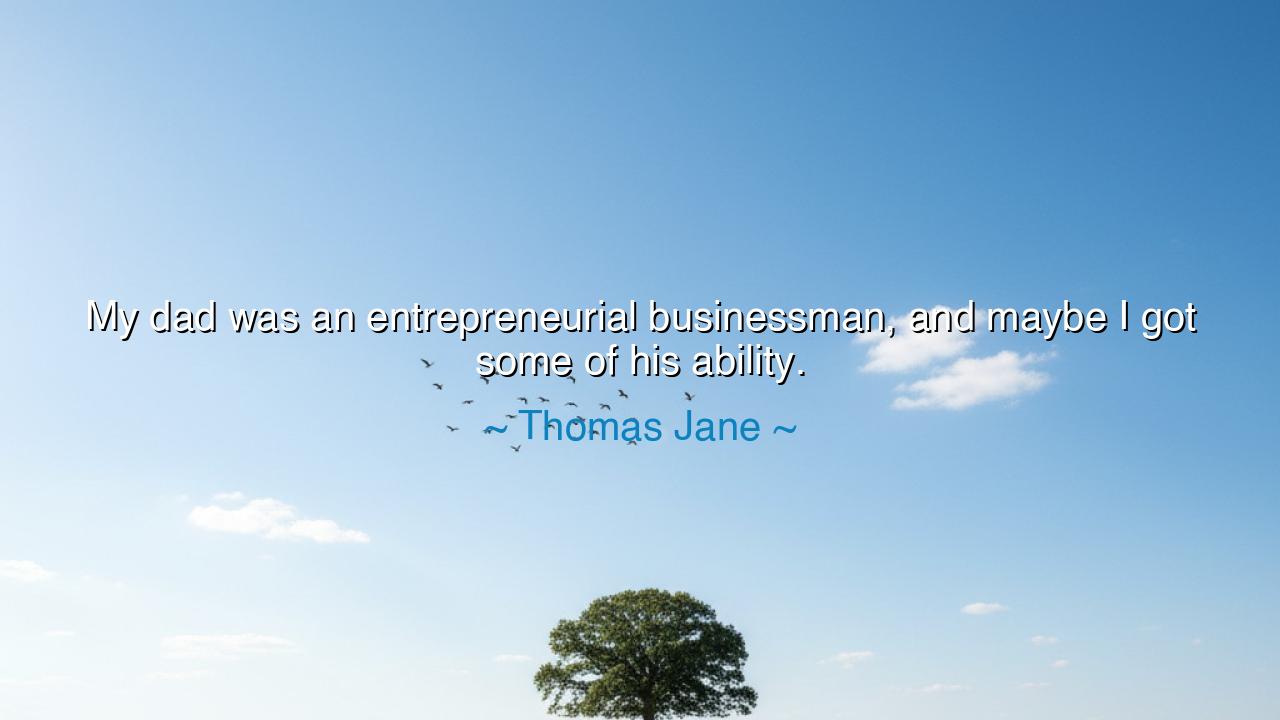
My dad was an entrepreneurial businessman, and maybe I got some






In a voice of humble reflection, Thomas Jane once said: “My dad was an entrepreneurial businessman, and maybe I got some of his ability.” These words, though modest in form, carry the deep music of inheritance—the quiet truth that who we are is shaped by the hands and hearts of those who came before us. It is a recognition of lineage, not of wealth or privilege, but of spirit—the unseen qualities passed from one generation to the next, like a flame carried through the centuries. For within every child lies the echo of a parent’s courage, discipline, and dreams.
In the style of the ancients, we would say: a father’s strength is the root from which the son’s branches rise. When Thomas Jane speaks of his father as an entrepreneurial businessman, he honors not just a profession, but a way of being—a life lived with boldness, vision, and resolve. To be “entrepreneurial” is to look at the unknown and see possibility, to labor not for comfort but for creation. Such a father is not merely a provider; he is a builder of both livelihood and legacy. The son who watches learns more than he realizes—the art of perseverance, the wisdom of risk, the dignity of labor.
It is said that example is the first education, and indeed, this is the ancient truth hidden in Jane’s words. His father did not need to teach him through speeches or lectures; he taught by living. The son observed the long hours, the failed ventures, the moments of triumph earned through struggle. And from those observations was born the subtle inheritance—the ability, as Jane calls it—that no money could buy and no school could replace. This “ability” is not a mere talent for business; it is the inward strength to face uncertainty with purpose, to see the invisible thread between effort and reward.
So it has been since the dawn of time. The warrior learned the sword from his father’s calloused hands; the farmer learned the soil from his father’s weary gaze at dawn. In every age, the inheritance of character outweighed the inheritance of wealth. Consider the story of Marcus Aurelius, the philosopher-emperor of Rome. Though born into privilege, he credited his father—and more so, his guardians—with shaping his virtue. “From my father,” he wrote, “I learned modesty and a manly character.” Marcus ruled an empire, yet it was this invisible legacy, not his crown, that defined him. So too does Jane’s acknowledgment of his father remind us that true inheritance is measured not in possessions, but in principles.
Yet there is humility, too, in his words: “Maybe I got some of his ability.” He does not claim mastery or entitlement, but grace. For the wise know that inheritance is not destiny—it is potential. The gifts of our parents are seeds, not guarantees. What we do with them—how we nurture, test, and expand them—is the measure of our own character. The son who receives his father’s courage must choose whether to wield it or waste it. Thus, Jane’s reflection becomes an invitation to gratitude and responsibility: to recognize what has been given and to build upon it.
Let us take from this truth a lesson for our own lives. Whether our parents were mighty or humble, whether they succeeded or failed, they gave us something of themselves—a spark, a skill, a story, a struggle. We must look inward and ask, “What part of them lives in me?” If it is courage, let it make us bold. If it is compassion, let it make us kind. If it is pain, let it make us wise. For even the wounds of our parents can become the wisdom of their children when transformed by reflection and purpose.
And for those who walk now in the role of parent, mentor, or guide—remember this: every action you take is a lesson, every decision a silent inheritance. Your children may forget your words, but they will never forget your example. So live as one who builds foundations, not walls. Show them what it means to strive, to dream, to rise after failure. For in doing so, you ensure that generations yet unborn will say, as Thomas Jane did, “I got some of their ability.”
Thus, the teaching endures: our truest inheritance is not gold, but character; not fortune, but faith in ourselves. Honor those who built you, and continue their work with courage. For the legacy of the human spirit is a living thread, passed from father to son, mother to daughter, teacher to student—woven through time, binding us all in the eternal act of creation.






AAdministratorAdministrator
Welcome, honored guests. Please leave a comment, we will respond soon